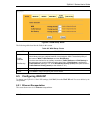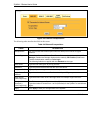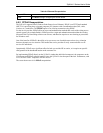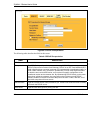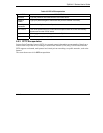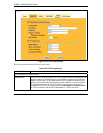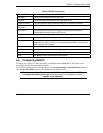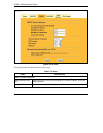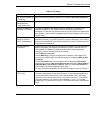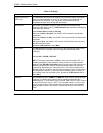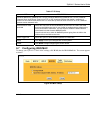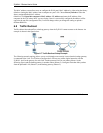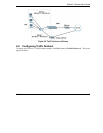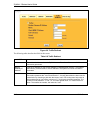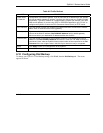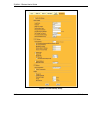
ZyWALL 2 Series User’s Guide
WAN Screens 6-11
Table 6-7 IP Setup
LABEL DESCRIPTION
My WAN IP Address (or
IP Address)
Enter your WAN IP address in this field if you selected Use Fixed IP Address.
My WAN IP Subnet
Mask (Ethernet
encapsulation only)
Type your network's IP subnet mask.
Remote IP Address (or
Gateway IP Address)
Type the IP address of the remote network or gateway. The gateway is an
immediate neighbor of your ZyWALL that will forward the packet to the
destination. On the LAN, the gateway must be a router on the same segment as
your ZyWALL; over the WAN, the gateway must be the IP address of one of the
remote nodes.
Remote IP Subnet
Mask (PPPoE and
PPTP encapsulation)
When using a LAN to LAN application, type the IP subnet mask of the
destination network. If you need to specify a route to a single host, use a subnet
mask of 255.255.255.255, in the subnet mask field, to force the network number
to be identical to the host ID.
Network Address
Translation
Network Address Translation (NAT) allows the translation of an Internet protocol
address used within one network (for example a private IP address used in a
local network) to a different IP address known within another network (for
example a public IP address used on the Internet).
Choose None to disable NAT.
Choose SUA Only if you have a single public IP address. SUA (Single User
Account) is a subset of NAT that supports two types of mapping: Many-to-One
and Server.
Choose Full Feature if you have multiple public IP addresses. Full Feature
mapping types include: One-to-One, Many-to-One (SUA/PAT), Many-to-Many
Overload, Many- One-to-One and Server. When you select Full Feature you
must configure at least one address mapping set!
For more information about NAT refer to the NAT chapter in this User's Guide.
Metric (PPPoE and
PPTP only)
This field sets this route's priority among the routes the ZyWALL uses.
The metric represents the "cost of transmission". A router determines the best
route for transmission by choosing a path with the lowest "cost". RIP routing
uses hop count as the measurement of cost, with a minimum of "1" for directly
connected networks. The number must be between "1" and "15"; a number
greater than "15" means the link is down. The smaller the number, the lower the
"cost".



